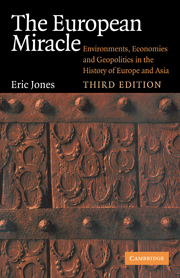Book contents
- Frontmatter
- Contents
- Preface to the third edition
- Preface and acknowledgements
- Introduction to the second edition
- Map
- EURASIA
- EUROPE
- THE WORLD
- ASIA
- EURASIA
- Afterword to the third edition
- Annotated bibliographical guide to Eurasian economic history in the very long term
- Bibliography
- Supplementary bibliographical guide
- Index
Preface to the third edition
Published online by Cambridge University Press: 05 June 2012
- Frontmatter
- Contents
- Preface to the third edition
- Preface and acknowledgements
- Introduction to the second edition
- Map
- EURASIA
- EUROPE
- THE WORLD
- ASIA
- EURASIA
- Afterword to the third edition
- Annotated bibliographical guide to Eurasian economic history in the very long term
- Bibliography
- Supplementary bibliographical guide
- Index
Summary
A retired farmer from just outside Oxford used patiently to instruct me in how to appraise cattle. I have long forgotten most of his teaching but I have never forgotten one of his anecdotes. An old Irish dealer said to him at Rugby market in 1904, ‘Ah, my boy, if you spot a crowd coming down the road, go the other way and see if they've dropped anything.’ It was in that spirit that I wrote The European Miracle.
The first plan of the book was set down in 1972. I have it still. It is not very different from the published text; very little long-term, comparative history was produced in the interim before I sat down to write in 1979. Earlier, when I was an undergraduate in the 1950s, one could just sense the fading of an empirical economic history written by people who sought the significance of the world of their own not-so-distant ancestors. ‘People in whom tradition abides are less the product of their own time than of much longer earlier periods’, as Don Haworth commented in his Bright Morning, of which the subtitle is Images of a Lancashire Boyhood. They understood the life of the past but longed to know what had made it tick. They approached the subject intrigued by the genesis of the factory system, awed by industrialization's feats of engineering, appalled by lives spent cramped in back-to-backs, and anxious to grasp how Britain's industrial supremacy seemed already to have slipped away.
- Type
- Chapter
- Information
- The European MiracleEnvironments, Economies and Geopolitics in the History of Europe and Asia, pp. ix - xiiPublisher: Cambridge University PressPrint publication year: 2003
- 1
- Cited by



